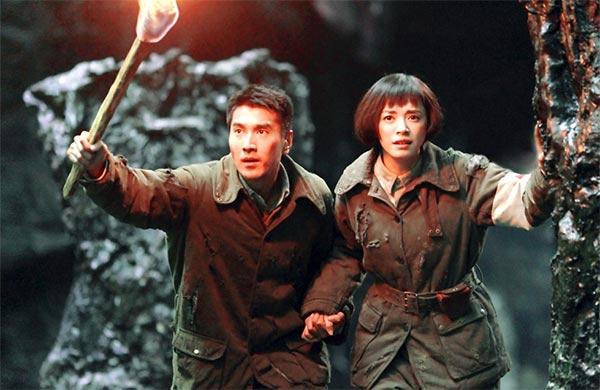
The gap between domestic blockbusters and their Hollywood counterparts is closing, especially in visual effects.
In recent years, inspired by high-grossing Hollywood pictures, domestic filmmakers have attempted to cash in on films driven by special effects.
Although many works in the early stages failed to meet the audience expectations, effects have gradually improved.
Ticket sales of "Chronicles of the Ghostly Tribe", a 3D action-thriller, exceeded 500 million yuan ($78.8 million) during the seven-day National Day holiday after opening on Sept 30.
The success of the film by Lu Chuan, whose previous work includes "City of Life and Death", trailed behind upbeat box office sales of two other films that rely heavily on visual effects.
"Monkey King: Hero is Back", a 3D animated feature, raked in about 900 million yuan, setting a box office record for domestic animation.
With sales exceeding 2.429 billion yuan, homegrown live-action animation "Monster Hunt" took this year's top spot from Hollywood smash "Furious 7" with 2.427 billion yuan in mid-September, becoming the highest-grossing film in China's movie history.
The three, which have won applause for delicate visual effects in addition to great story-telling, have outperformed Hollywood blockbusters in the Chinese market.
In 2014, "Godzilla" and "Interstellar" only reaped 486 million and 751 million yuan respectively in China, according to statistics from the State Administration of Press, Publication, Radio, Film and Television (SARFT).
"Chronicles of the Ghostly Tribe" beat "Minions" and "Mission: Impossible -- Rogue Nation" in ticket sales during the National holiday.
Zhang Yiwu, a professor and film critic of Peking University, said the stunning performance of movies mentioned above have displayed great progress in the quality of Chinese commercial films and a narrowing gap between the domestic film industry and Hollywood.
He attributed the phenomenon to the ever expanding Chinese film market, which is the world's second largest.
According to SARFT data, it took eight years for China's total box office to shift from less than 900 million yuan in 2002 to more than 10 billion yuan in 2010.
Three years later, China's 2013 box office reached to 20 billion yuan.
By Sept 5, Chinese cinemas took in 30 billion yuan, already exceeding the 2014 total of 29.6 billion yuan.
Lu Chuan, the director of "Chronicles of the Ghostly Tribe", agreed China is catching up but stressed the country's film industry still lags behind Hollywood's special effect techniques and investment.
To ensure quality, Lu invited special effect teams from "The Day After Tomorrow" and "Gravity" to participate in the post-production of his new movie, an "unsustainable" practice in Lu's opinion.
"We cannot count on Hollywood professionals every time we need help, it will cost us a fortune," said the famed director.
Before shooting, Lu was told the visual effects he wanted in the movie would cost $100 million in Hollywood.
With a limited budget of around 90 million yuan, Lu had to split the visual effect project and let Chinese post-production teams do most of the work to lower costs.
However, Zhang believed budget will not be a problem for homegrown films much longer.
The Chinese film market now provides huge profits for filmmakers and investors, luring and enabling them to be bold in investing in special effect films, said Zhang.
"Bigger investment in production guarantees better visual effects in products. That's why recent domestic films have become a success in cinemas," said Zhang.
In addition to increasing investment, Lu believes building a team of professionals in China is crucial for improving the visual effect of homegrown movies.
It requires training domestic talent and attracting foreign professionals at the same time, he said.
"Monster Hunt" is a good example. The blockbuster's director Xu Chengyi recruited a post-production team whose members were nearly all Chinese.
With his rich experience good example. Theof working as an animator and director for Dreamworks Animation for more than 20 years, Xu, born in Hong Kong and best known for co-directing "Shrek the Third", has led a domestic team to huge commercial success that broke numerous box office records.
To compete with Hollywood in visual effects and eventually match it one day, the homegrown film industry needs to involve more talent both at home and abroad to boost competition, said Zhang.





